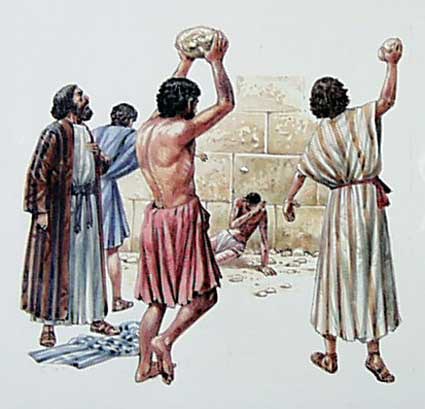I am grateful to Christ Jesus our Lord, who has strengthened me, because he judged me faithful and appointed me to His service, even though I was formerly a blasphemer, a persecutor, and a man of violence. I Timothy 1.12-13 NRSV
T his is the beginning of the passage in which Paul says “It is a trustworthy statement deserving full acceptance that Christ Jesus came into the world to save sinners, among whom I am the worst.” This statement would not carry nearly so much weight without Paul’s description of himself before his encounter with Jesus on the Damascus road. We know from the book of Acts that Paul (known by his birth-name Saul) was present to give sanction to the stoning of Stephen, then continued to pursue a violent, targeted campaign against Christians (Acts 7.60-8.1; 9.1). We know that he sought to expand this program of violence beyond Judea and into Syria (9.2). We know how violent and extreme his actions were from his own description of them in the verses above.
his is the beginning of the passage in which Paul says “It is a trustworthy statement deserving full acceptance that Christ Jesus came into the world to save sinners, among whom I am the worst.” This statement would not carry nearly so much weight without Paul’s description of himself before his encounter with Jesus on the Damascus road. We know from the book of Acts that Paul (known by his birth-name Saul) was present to give sanction to the stoning of Stephen, then continued to pursue a violent, targeted campaign against Christians (Acts 7.60-8.1; 9.1). We know that he sought to expand this program of violence beyond Judea and into Syria (9.2). We know how violent and extreme his actions were from his own description of them in the verses above.
The word “persecute” means to stalk, to hunt down. That is pretty vivid, but the really graphic word is the one translated “man of violence.” Reinecker & Rogers in the Linguistic Key to the Greek New Testament (Zondervan, 1976) describe it this way:
…a sadist, a violent person….one who deliberately and contemptuously mistreats another person for the sake of hurting and deliberately humiliating that person. It speaks of treatment which is calculated to publicly insult and openly humiliate…. (p.617).
There is an element of cruelty, of hatred, of evil in all this that suggests the pathological. The monomaniacal intensity of Paul’s (Saul’s) relentless pursuit of Christians calls into question his character at that time. This seems to denote something more than religious fervor – it suggests heartlessness. Keeping in mind that these are Paul’s own words to describe himself, we fully understand his sincerity when he tells us, essentially, “If I can be saved, anyone can be saved” (I Timothy 1.15-16).
This is important to remember, because it is so easy to think of others, and at times to think of ourselves, as unredeemable. This is also important because we see that the elements that go into making the vices of an unredeemed life, can become the building blocks of virtue.
I think of the single-mindedness, focus, resolve, and determination it took to be such a rabid persecutor, and then I think of the single-mindedness, focus, resolve, and determination it took to survive the beatings, the stonings, the arrests, the mob-violence, the shipwrecks, the starvation, the stress.
I think of a moment when Paul, Barnabas, and Peter were at Antioch as some from James came to Jerusalem demanding that Jewish Christians not fraternize with Gentile Christians (Galatians 2.11-21). Peter caved in. Even Barnabas caved in. But Paul stood firm. Paul did not back down. Paul stood toe-to-toe, and face-to-face with Peter and publicly rebuked him for his hypocrisy. Barnabas, “the encouragement guy” was not prepared to be the “face-down-an-apostle” guy. Paul, the past “pit-bull” was.*
My point is – or rather Paul’s point is that no life is unredeemable, and that the raw material of any person’s life can become the building blocks, in the hands of the Holy Spirit, of a holy life.
*No offense to pit-bulls, or their owners. All the pit-bulls I know personally are very sweet, loving dogs.




